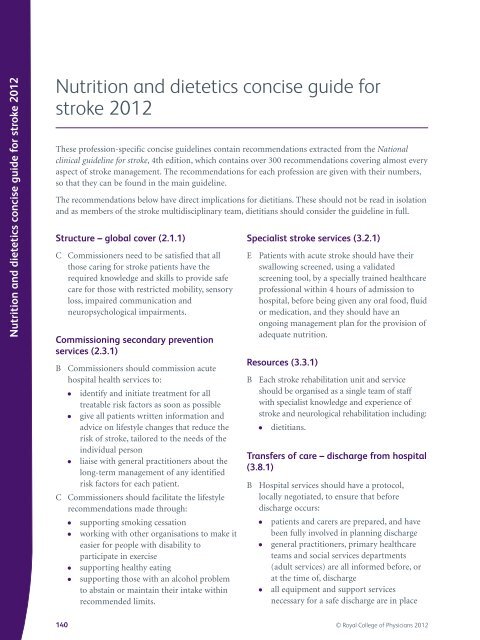national-clinical-guidelines-for-stroke-fourth-edition
national-clinical-guidelines-for-stroke-fourth-edition
national-clinical-guidelines-for-stroke-fourth-edition
You also want an ePaper? Increase the reach of your titles
YUMPU automatically turns print PDFs into web optimized ePapers that Google loves.
Nutrition and dietetics concise guide <strong>for</strong> <strong>stroke</strong> 2012<br />
Nutrition and dietetics concise guide <strong>for</strong><br />
<strong>stroke</strong> 2012<br />
These profession-specific concise <strong>guidelines</strong> contain recommendations extracted from the National<br />
<strong>clinical</strong> guideline <strong>for</strong> <strong>stroke</strong>, 4th <strong>edition</strong>, which contains over 300 recommendations covering almost every<br />
aspect of <strong>stroke</strong> management. The recommendations <strong>for</strong> each profession are given with their numbers,<br />
so that they can be found in the main guideline.<br />
The recommendations below have direct implications <strong>for</strong> dietitians. These should not be read in isolation<br />
and as members of the <strong>stroke</strong> multidisciplinary team, dietitians should consider the guideline in full.<br />
Structure – global cover (2.1.1)<br />
C Commissioners need to be satisfied that all<br />
those caring <strong>for</strong> <strong>stroke</strong> patients have the<br />
required knowledge and skills to provide safe<br />
care <strong>for</strong> those with restricted mobility, sensory<br />
loss, impaired communication and<br />
neuropsychological impairments.<br />
Commissioning secondary prevention<br />
services (2.3.1)<br />
B Commissioners should commission acute<br />
hospital health services to:<br />
● identify and initiate treatment <strong>for</strong> all<br />
treatable risk factors as soon as possible<br />
● give all patients written in<strong>for</strong>mation and<br />
advice on lifestyle changes that reduce the<br />
risk of <strong>stroke</strong>, tailored to the needs of the<br />
individual person<br />
● liaise with general practitioners about the<br />
long-term management of any identified<br />
risk factors <strong>for</strong> each patient.<br />
C Commissioners should facilitate the lifestyle<br />
recommendations made through:<br />
● supporting smoking cessation<br />
● working with other organisations to make it<br />
easier <strong>for</strong> people with disability to<br />
participate in exercise<br />
● supporting healthy eating<br />
● supporting those with an alcohol problem<br />
to abstain or maintain their intake within<br />
recommended limits.<br />
Specialist <strong>stroke</strong> services (3.2.1)<br />
E Patients with acute <strong>stroke</strong> should have their<br />
swallowing screened, using a validated<br />
screening tool, by a specially trained healthcare<br />
professional within 4 hours of admission to<br />
hospital, be<strong>for</strong>e being given any oral food, fluid<br />
or medication, and they should have an<br />
ongoing management plan <strong>for</strong> the provision of<br />
adequate nutrition.<br />
Resources (3.3.1)<br />
B Each <strong>stroke</strong> rehabilitation unit and service<br />
should be organised as a single team of staff<br />
with specialist knowledge and experience of<br />
<strong>stroke</strong> and neurological rehabilitation including:<br />
● dietitians.<br />
Transfers of care – discharge from hospital<br />
(3.8.1)<br />
B Hospital services should have a protocol,<br />
locally negotiated, to ensure that be<strong>for</strong>e<br />
discharge occurs:<br />
● patients and carers are prepared, and have<br />
been fully involved in planning discharge<br />
● general practitioners, primary healthcare<br />
teams and social services departments<br />
(adult services) are all in<strong>for</strong>med be<strong>for</strong>e, or<br />
at the time of, discharge<br />
● all equipment and support services<br />
necessary <strong>for</strong> a safe discharge are in place<br />
140 © Royal College of Physicians 2012


